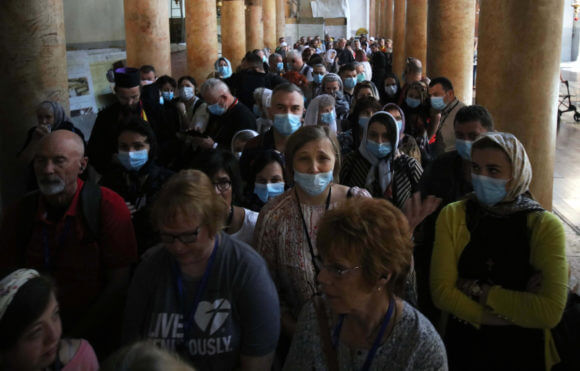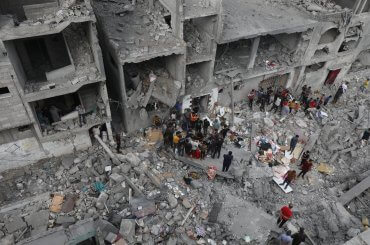Palestinians are holding their breath as they wait to see if the Palestinian Authority’s desperate attempts to contain the spread of the novel coronavirus (COVID-19) to the city of Bethlehem is working.
Panic grew on Monday after the Palestinian Ministry of Health announced that there was one confirmed case of the virus in the northern occupied West Bank city of Tulkarem, the first case of the virus outside of Bethlehem.
Local media reported that an unidentified Palestinian man from Tulkarem contracted the virus while he was working in Israel, but that he was quarantined immediately along with his entire family — none of whom tested positive for the virus.
In Bethlehem, the number of confirmed cases had risen to 28 on Tuesday. All of the confirmed cases were reportedly being held in quarantine at different locations across the city, except for one who was reportedly being held in a hospital after his health deteriorated.
So far, the ministry of health has reported that all the 29 people in Palestine, except for one, who tested positive for coronavirus were in good health, and displaying little to no symptoms.
Across the West Bank, East Jerusalem, and Gaza, 2,900 Palestinians were being held in self-quarantine — six of them in Jerusalem, and 605 people in Gaza who had recently returned from performing the Umrah pilgrimage in Saudi Arabia.

Closing borders
As the number of cases in both Israel and Palestine continued to rise, both governments escalated efforts to contain the virus.
Israel announced on Monday that it would be enforcing a 14-day quarantine for every single person entering the country, including Israeli citizens and foreign nationals. So far, there have been at least 50 confirmed cases of the virus in Israel, and no deaths.
Meanwhile, Palestinian and Jordanian authorities have been floating around the idea of closing Palestine’s only border with the outside world, the King Hussein (Allenby) Bridge, between the West Bank and Jordan.
After a number of reports claiming the border had been shut, PA spokesman Ibrahim Melhem said that the border was still open for the time being, but could be closed “at any moment” in coordination with the Jordanian and Palestinian governments.
The Times of Israel reported that while the border was still open to Palestinians traveling to and from the West Bank and East Jerusalem, the Jordanian government had decided to close the border to any non-Palestinians.
While most tourists have been evacuated from Bethlehem and other tourist hotspots in the West Bank, the closure of the bridge could present an issue for the hundreds of foreign nationals living and working in the West Bank who use the bridge exclusively to travel outside of the country.
Shutdowns continue across West Bank
In Bethlehem, the epicenter of the outbreak in Palestine, the PA has stepped up its security at entry and exit points around the city, preventing anyone from the city from leaving its municipal boundaries.
It has been reported that only special cases with approval from the governor of the Bethlehem district have been allowed to leave the city.
Schools, universities, banks, and government offices have remained closed, and hotels, restaurants, and dozens of souvenir shops across the city have kept their doors shut.
The streets of the city have remained relatively empty as the ministry of health continued to urge people to stay in their homes and avoid contact with people outside their immediate family as much as possible.
While the virus has yet to spread to other districts, save one case in Tulkarem, other districts across the West Bank are stepping up preventative measures in the hopes that they can avoid the same fate as Bethlehem.
The governor of the Ramallah district Leila Ghannam ordered on Tuesday that all restaurants, cafes, gyms, and sports facilities be closed indefinitely. She also suspended all indoor and outdoor public gatherings.
In Hebron, health workers were deployed across the city to fumigate public areas like municipal facilities, public parks, bus and taxi stations, and mosques.
Similar measures have been employed in Jericho and the Jerusalem district of the West Bank as well.


